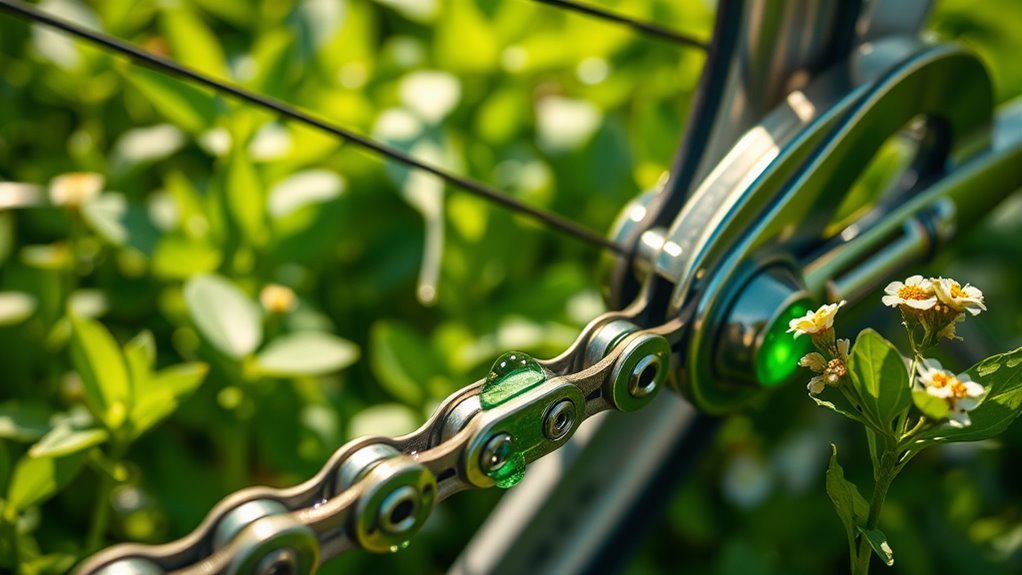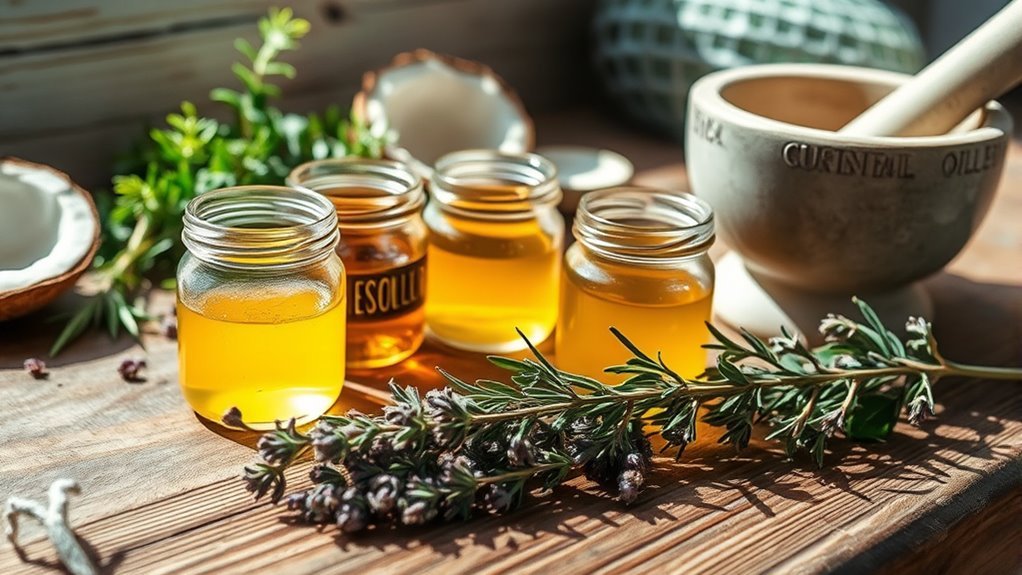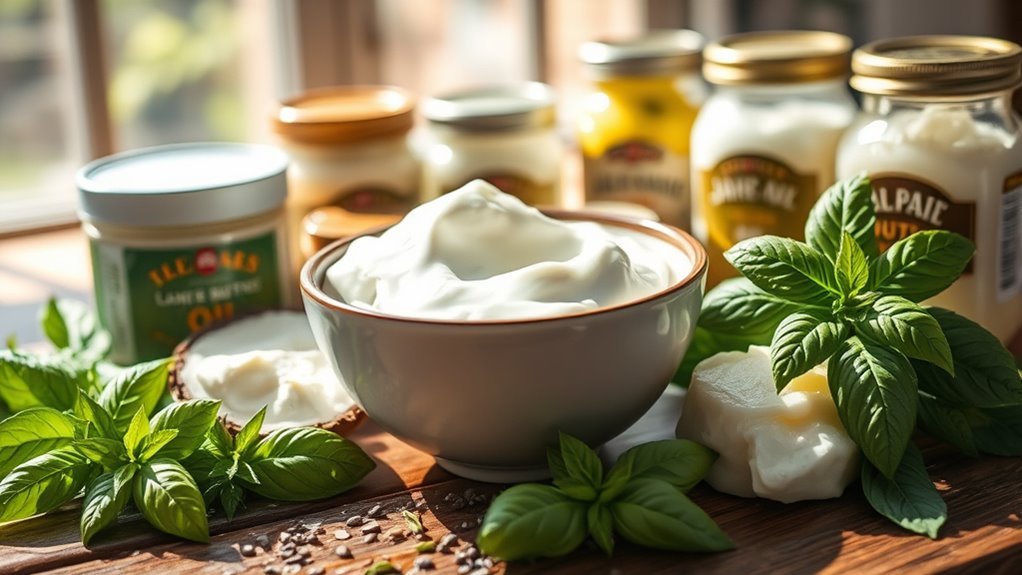Eco-Friendly Alternatives to Grease
You can switch to eco-friendly grease alternatives made from plant-based oils and natural waxes, which offer excellent lubrication while being biodegradable and less toxic. These options reduce environmental risks like soil and water contamination without compromising performance or machinery lifespan. They meet strict environmental standards, support sustainability, and lower your carbon footprint. Plus, homemade mixes using beeswax and oils give you control over ecological impact. Keep exploring to understand their performance and proper disposal methods.
Benefits of Using Eco-Friendly Grease Alternatives

While traditional greases often contain harmful chemicals that can damage the environment, eco-friendly grease alternatives offer significant benefits by reducing toxicity and improving biodegradability. When you choose these alternatives, you actively support sustainability practices that prioritize minimizing ecological impact. Eco friendly materials used in these greases break down more readily, preventing long-term soil and water contamination. In addition, their reduced chemical toxicity safeguards ecosystems and human health without compromising performance. By adopting eco-friendly greases, you align with responsible resource management and contribute to lowering your carbon footprint. This choice grants you the freedom to maintain machinery efficiently while respecting environmental limits. Evidence consistently shows that eco-friendly lubricants deliver comparable mechanical benefits with enhanced environmental compatibility, making them a smart, conscientious option for sustainable operations. Moreover, selecting products with biodegradable packaging further reduces environmental impact by minimizing landfill waste.
Plant-Based Oils as Sustainable Lubricants
Because plant-based oils possess inherent biodegradability and low toxicity, they have emerged as leading candidates for sustainable lubricants. When you choose plant-based oils, you tap into their plant based advantages, such as excellent lubricity and thermal stability, which rival many synthetic options. These oils derive from renewable crops, ensuring sustainable sourcing that reduces environmental impact compared to petroleum-based lubricants. Evidence shows they break down naturally without leaving harmful residues, aligning with your goal for eco-friendly performance. Additionally, plant-based oils support reduced carbon footprints and promote agricultural economies, granting you freedom from reliance on finite resources. However, you must consider factors like oxidation resistance and cold flow behavior to select formulations suited to your specific needs. Overall, plant-based oils offer a scientifically sound, sustainable path for lubrication without compromising on efficiency. Using eco-friendly cleaning practices alongside plant-based lubricants further enhances environmental benefits by minimizing chemical waste.
Biodegradable Grease Options for Household Use

Building on the benefits of plant-based oils, biodegradable greases offer a practical solution for household lubrication needs without compromising environmental safety. These greases utilize biodegradable ingredients such as vegetable oils and natural thickeners, ensuring they break down swiftly in the environment. For your household applications—like lubricating door hinges, garden tools, or appliance parts—these greases reduce toxic runoff risks common with petroleum-based alternatives. Scientific studies confirm that biodegradable greases maintain comparable performance in temperature stability and wear resistance, providing reliability without environmental trade-offs. By choosing these eco-friendly options, you’re supporting sustainability while preserving the freedom to maintain your home efficiently. Their compatibility with standard materials and ease of application make them a smart, responsible choice for everyday lubrication tasks. Additionally, regular maintenance and cleaning are important to prevent buildup and ensure the best performance of lubricated parts, as grease accumulation can lead to damage and inefficiency in household appliances and tools, highlighting the importance of regular cleaning.
Natural Waxes and Their Applications in Lubrication
If you’re seeking a sustainable lubrication option, natural waxes offer a compelling choice due to their unique chemical properties and environmental benefits. Beeswax applications, for example, provide effective lubrication with natural water resistance and biodegradability. Its ester-based composition creates a protective film that reduces friction, making it ideal for light mechanical parts. Similarly, carnauba wax, derived from palm leaves, boasts a high melting point and hardness, which enhances durability in demanding conditions. Studies demonstrate carnauba wax’s superior resistance to oxidation compared to synthetic alternatives, extending lubricant lifespan. Using these natural waxes, you gain eco-friendly lubrication that aligns with your freedom to choose sustainable solutions without sacrificing performance. Their renewability and minimal environmental impact confirm that natural waxes are viable, precise alternatives to conventional greases.
How to Make Your Own Eco-Friendly Grease at Home

Natural waxes like beeswax and carnauba provide a solid foundation for creating eco-friendly greases that meet both performance and environmental standards. To make your own eco-friendly grease at home, start by combining these waxes with natural oils such as coconut or jojoba oil. Precise homemade mixtures depend on carefully balanced ingredient ratios; a common formulation uses 20% beeswax to 80% oil by weight. Melt the wax gently, then blend in the oil while stirring consistently to guarantee uniformity. Adjusting ingredient ratios affects consistency and lubrication properties, allowing you to tailor the grease for specific applications. By understanding these proportions and selecting biodegradable components, you maintain control over both functionality and ecological impact—granting you the freedom to craft a sustainable solution without compromising performance.
Comparing Performance: Eco-Friendly vs. Traditional Grease
When comparing eco-friendly grease to traditional options, you’ll want to examine lubrication efficiency under varying operational conditions. You should also consider temperature tolerance and wear resistance to guarantee performance reliability. Finally, evaluating the environmental impact provides an extensive view of their overall sustainability benefits.
Lubrication Efficiency Comparison
How do eco-friendly greases stack up against traditional options in lubrication efficiency? When evaluating lubrication methods, eco-friendly greases demonstrate comparable performance across key efficiency metrics such as friction reduction, load-carrying capacity, and film stability. Rigorous testing shows that bio-based lubricants often match or slightly exceed synthetic greases in minimizing wear, thanks to advanced additive formulations. You’ll find that their natural base oils maintain consistent viscosity under varying conditions, ensuring reliable protection. However, the specific application and operating environment critically influence outcomes, so it is crucial to assess compatibility. By focusing on precise efficiency metrics, you can confidently select eco-friendly lubricants that deliver freedom from environmental harm without compromising mechanical performance. This balance empowers you to make informed choices aligned with sustainability and high functionality.
Temperature and Wear Resistance
Although eco-friendly greases often face skepticism regarding their durability, studies reveal they hold up well against traditional greases in temperature and wear resistance. You’ll find that many bio-based greases exhibit comparable temperature stability, maintaining performance across wide thermal ranges. This means you won’t sacrifice reliability even under high heat conditions. Regarding wear prevention, eco-friendly options often incorporate advanced additives that reduce metal-to-metal contact effectively. Laboratory tests measuring wear scars confirm their ability to protect moving parts matches or sometimes surpasses conventional greases. So, if you’re seeking alternatives without compromising machinery lifespan, these greener options offer robust protection. By choosing eco-friendly greases, you don’t just reduce environmental impact—you also retain the freedom to operate with confidence in demanding conditions.
Environmental Impact Assessment
Since environmental concerns are driving many industries to reconsider their lubricant choices, evaluating the ecological footprint of eco-friendly greases compared to traditional options is essential. You’ll find that eco-friendly greases typically comply better with stringent environmental regulations, reducing toxic emissions and minimizing soil and water contamination. Their formulations often emphasize biodegradability and lower toxicity, aligning with advanced sustainability practices. In contrast, traditional greases, based on petroleum derivatives, tend to persist in ecosystems, posing long-term environmental risks. Life cycle assessments reveal that while performance metrics like temperature and wear resistance may be comparable, the overall environmental burden is markedly lower for eco-friendly alternatives. By choosing these products, you not only meet regulatory demands but also support a shift toward responsible resource use, granting you freedom from ecological harm without compromising operational efficiency.
Tips for Proper Disposal and Recycling of Grease Products
Where should you dispose of used grease to minimize environmental harm? Proper grease disposal is essential to prevent clogged drains and water pollution. You should never pour grease down the sink or toilet. Instead, collect used grease in a sealed container and take it to designated recycling centers. Recycling methods for grease include converting it into biodiesel or repurposing it in industrial applications. These methods reduce landfill waste and lower reliance on fossil fuels. By following local guidelines for grease disposal, you protect ecosystems and maintain your freedom from costly plumbing repairs. Staying informed about recycling options empowers you to make environmentally responsible choices without sacrificing convenience. Ultimately, responsible grease disposal and recycling methods contribute to a sustainable future while preserving your independence.
Frequently Asked Questions
Are Eco-Friendly Greases Safe for Use on Food Processing Equipment?
You’ll find that eco-friendly greases can be safe for use on food processing equipment, provided they meet strict food safety and processing standards. These greases must be non-toxic, resistant to contamination, and compliant with regulatory guidelines like NSF H1. By choosing certified products, you maintain equipment efficiency without compromising hygiene. Always verify the grease’s certification to guarantee it aligns with your operational freedom and commitment to safe, sustainable practices.
How Do Eco-Friendly Greases Affect Machinery Warranty Terms?
When considering warranty implications, you need to carefully review manufacturer policies before using any alternative lubricants. Many manufacturers specify approved greases, and deviating from these can void your machinery’s warranty. However, some are now updating policies to include eco-friendly options. To maintain your equipment’s coverage and freedom to choose, always verify compatibility and get written confirmation from the manufacturer, ensuring your warranty remains intact while embracing sustainable practices.
Can Eco-Friendly Grease Alternatives Be Used in Extreme Temperature Conditions?
You’ll find that using greases with strong temperature resistance is essential for extreme conditions. When you compare performance, some eco-friendly alternatives match or even exceed traditional greases in maintaining lubrication and protecting machinery at high or low temperatures. However, you need to evaluate specific product data, as not all eco-friendly options handle extremes equally well. Choosing based on evidence guarantees your equipment’s freedom to operate reliably without compromise.
What Certifications Should I Look for in Eco-Friendly Grease Products?
You know what they say: “The proof is in the pudding.” When choosing eco-friendly grease, look for certification labels like NSF H1, USDA BioPreferred, and EU Ecolabel. These certifications indicate adherence to strict eco friendly standards, ensuring the product is safe and sustainable. By relying on verified labels, you gain the freedom to select greases that protect both your equipment and the environment with confidence.
Are There Any Known Allergic Reactions to Natural Wax Lubricants?
You might experience allergy symptoms if you’re sensitive to certain natural waxes, such as beeswax or carnauba. While natural wax benefits include biodegradability and non-toxicity, some individuals report skin irritation or respiratory issues. It’s crucial to test a small area first and consult product safety data. Overall, allergic reactions are rare but possible, so staying informed lets you enjoy natural wax lubricants safely and freely.






